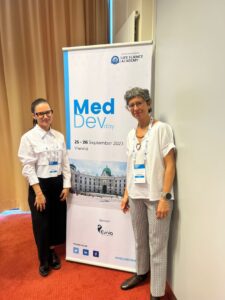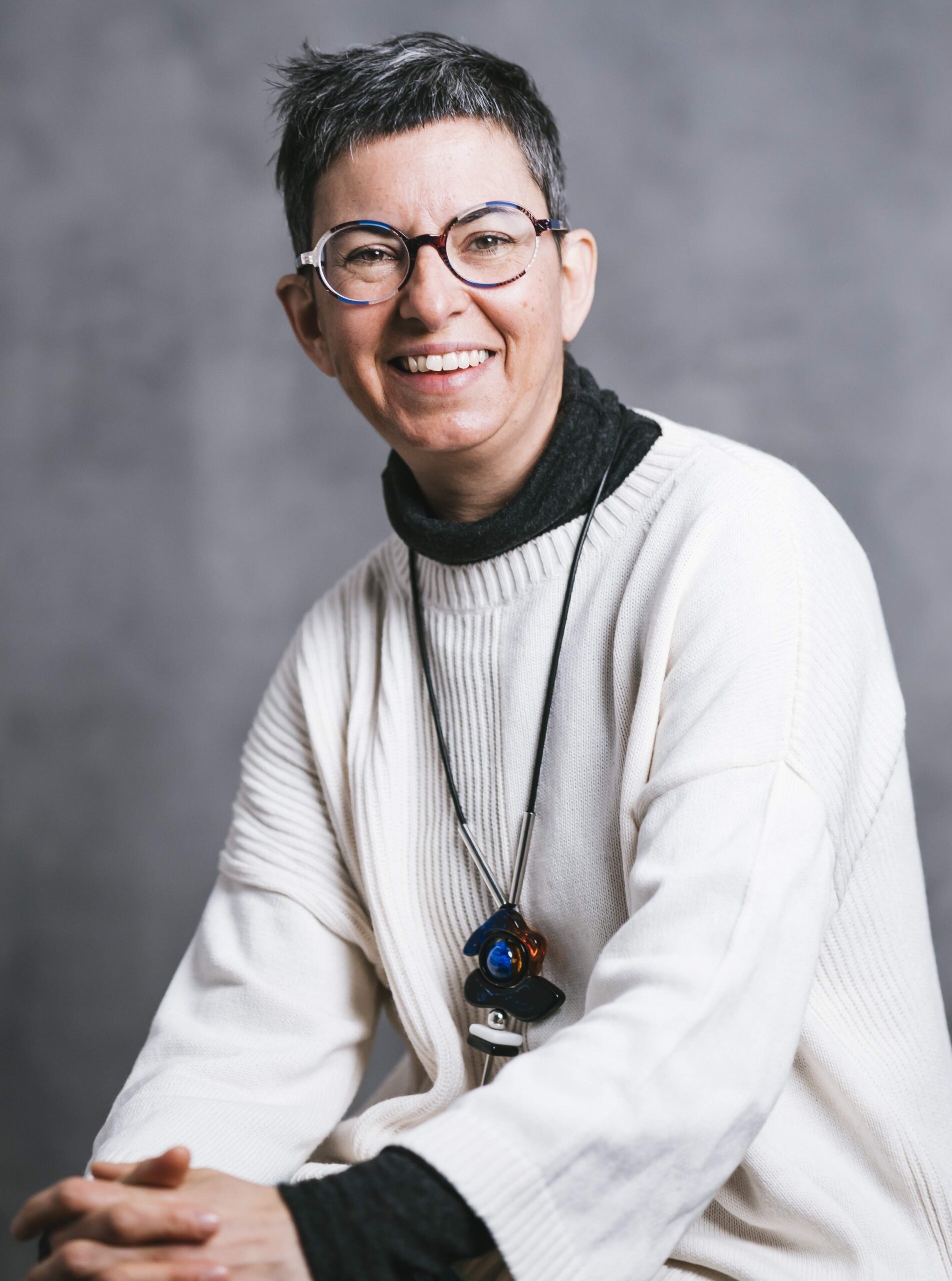Our series, dedicated to raising awareness about the world of medical writing, a field still relatively unknown in Italy, continues. This time, we talked with Laura Collada Ali, Medical Writing Manager at Worldwide Clinical Trials and member of the EMWA Executive Committee. Laura shared her vision of medical writing with us, offering precious tips and explaining her viewpoints, drawing on her twenty-year experience in this sector.
Background
Laura Collada Ali belongs to the 5% of medical writers who come from a linguistics degree. In Europe, around 20% of medical writers do not have a scientific degree; of this group, only a tiny fraction has a linguistic background. Laura graduated in translation and interpreting at the University of Alicante in Spain, specializing in medical translation. However, her professional career did not start with translations but with writing.
Laura started working at the European Organisation for Research and Treatment of Cancer (EORTC) in Belgium, an independent research organization. Here, thanks to her mastery of several foreign languages (Spanish, English, French, Italian, and some Arabic) and her specialization in medicine, she managed an international committee of experts to revise research protocols. “I continued to do a lot of training on the medical side and, therefore, on the scientific side, and basically, I managed the revision of research protocols for this committee“, Laura remembers. After a few years, Laura moved to Italy, working in independent organizations dealing with clinical research in hematological oncology, such as the GIMEMA data center in Rome.
In 2011, Laura moved to Valle D’Aosta and got her VAT Number. Afterwards, after attending her first EMWA conference, she found out that her job had a name: Medical Writing. From that moment on, she started presenting herself as a medical writer, working on a wide range of documents for drugs and medical devices in the premarket and post-marker phases. “From that moment on, I have always introduced myself in professional contexts as a medical writer. And a whole new world opened up to me“, Laura says.
Over the years, Laura has held many roles in EMWA. Currently, with Jules Kovacevic, she is Education Officer, responsible for training management through workshops, expert discussion groups, and webinars. This role includes the assessment of new workshop proposals, the monitoring of their execution, and the analysis of their quality through feedback from participants to ensure a continued quality process. Furthermore, Laura is a member of the Medical Devices Special Interest Group and of the Communicating with the Public Special Interest Group, as well as leading several workshops on topics such as the clinical documentation for medical devices or the writing of medical texts for laymen such as patients.
Topics covered
During her career, Laura has worked on various topics, including orthopedics. In 2017, with the entry into force of the new regulation on medical devices, she received numerous requests in this sector. Her tendency has been not specializing in a type of document but in the area of medicine. She has worked extensively in oncology and orthopedics but is always ready to tackle new therapeutic challenges. “I have no difficulty moving from one topic to another. On the contrary, a difficulty is a little bit like a challenge, and I enjoy it“, Laura explains.

After 13 years as a freelancer, Laura decided to join a large private company. In February 2024, she started working for Worldwide Clinical Trials, a large American CRO with around 4,500 employees. There, she manages medical writing projects for unregistered drugs and cutting-edge clinical trials. “I had gained a lot of experience in independent research, but I had never joined a large pharmaceutical company or a CRO,” Laura says.
Training
Laura has earned several certificates throughout her career, including those from EMWA, which she considers a great visiting card. However, she stresses the importance of participating in the EMWA conferences to engage with peers, network, and stay up to date. “What has helped me a lot with EMWA is being involved and active in the association“, Laura explains.”Now, I am one of the members of the Executive Committee, so I’m always somewhat in the midst of everything, and this holds significant value for my career“.
Where to start?
According to Laura, there is no one-size-fits-all path to becoming a medical writer. It is possible to get there from different degrees, including scientific and linguistic ones. While scientific degrees provide a solid technical background, they often need more language skills. On the contrary, those with a linguistic degree must train in the technical and medical aspects. Laura believes continuous training is paramount and that each path must be adapted to individual needs. “The message to get across is that you can get there from many different degrees, but training will then be continuous and never end“, she says.
Laura often discusses with the other EMWA members the need to define training paths for medical writing. The diversity of backgrounds makes it difficult to establish a single path. In the future, EMWA might offer different training paths depending on each member’s characteristics and needs. For example, someone with a scientific degree might need more language training, whereas someone with a linguistic degree might need more technical training.
The Knowledge of Foreign Languages
Indeed, the knowledge of foreign languages must be included among the skills of a medical writer. Laura speaks Spanish, Italian, English, and French fluently and believes this ability is paramount for a medical writer. The capacity to communicate with clients in their native language helps build customer loyalty and expand markets. Furthermore, understanding English is crucial, as most scientific publications and regulatory documents are written in this language. “English is a little bit like a lingua franca for science“, Laura points out. For this reason, the knowledge of English must be included among the prerequisites of a medical writer training.
First steps
Laura worked for a private company for about 10 years before becoming a freelancer. Her first client was her previous employer. As a freelancer, Laura mainly worked with small and medium-sized companies and independent researchers, providing medical communication and regulatory documentation services.
For those who wish to enter the world of medical writing, Laura recommends joining EMWA, attending its conferences, and networking. This approach allows you to present yourself as more credible and to get in touch with colleagues willing to mentor you or to pass on some work. “EMWA is a great place to start“, she says.
Difference between Medical Writing in Italy and Abroad
Laura says no significant difference exists between Medical Writing in Italy and abroad. In Italy, there is a greater flexibility in project management, with requests that can vary from writing in English, Italian, or a combination of the two in the so-called “Itanglish.” The situation is not very different from that in other European countries. However, the UK and Germany are the only exceptions to this general trend, as medical writing in these countries is more standardized and known, with specifically dedicated university courses. Laura believes the higher knowledge of this profession in these countries contributes to this difference: “As a matter of fact, most of the EMWA members are German and English,” she observes. Among the reasons for this difference, the presence of a more developed pharmaceutical industry cannot be ruled out, although there is no data available to support the hypothesis: “I could only say it as a feeling, but I do not have any data. Anyway, this might well be the case.”
Medical Writer as Consultant
Laura defines medical writers as consultants rather than mere writers. In addition to writing skills, a medical writer must have a solid understanding of clinical research, drug development, pharmaceutical regulations, and technical specifications in the different medical areas. “Medical writers are more consultants,” “, Laura says. “They must also be very well versed in regulatory strategy and not just in clinical strategy , …. (to) present data depending on the goal to achieve“.
Conclusion
The career of Laura Collada Ali shows how medical writing can include a variety of experiences and competencies and how commitment to continuous training and the activities of your professional community can open up new doors for new opportunities and professional satisfaction. Her story exemplifies how versatility, dedication, and adaptability can lead to success in a constantly evolving sector.


Leave a Reply